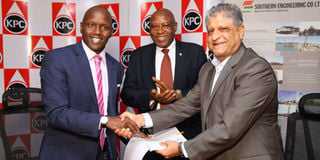KPC board members’ pay triples on record meetings

KPC Managing Director Joe Sang (left) flanked by SECO directors John Msafari (middle) and Arif Kurji (right). PHOTO COURTESY
What you need to know:
- Kenya Power’s director emoluments for the year to June 2016 summed up to Sh51.3 million, a drop from Sh54.8 million a year earlier. Its nine-member board held 14 meetings last year.
- Directors at KPC earn hefty monthly retainers, sitting allowances for every board meeting or board committee meeting attended, travel allowances.
- Energy Cabinet Secretary Charles Keter in April last year confirmed Mr Sang as managing director of Kenya Pipeline who had been acting for four months
The pay for Kenya Pipeline Company (KPC) board members fees and allowances more than tripled in the year to June 2016 dwarfing what is paid to peers in energy firms listed on the Nairobi bourse such as KenGen #ticker:KEGN and Kenya Power #ticker:KPLC.
The firm splurged Sh62.7 million from the Sh17.6 million paid out in the period to June 2015, highlighting the high cost taxpayers have to bear to pamper board members at the State-owned energy parastatals.
KPC chairman John Ngumi attributed the rise in board expenses to the record 86 board meetings held in the year under review, saying the team had to meet to deal with urgent matters such as overseeing project delivery and hiring new senior managers.
“We had more meetings than planned. The board had to push management and consultants to deliver on projects. The board technical committee held two weekly inspections of the Mombasa–Nairobi pipeline,” Mr Ngumi said in an interview with the Smart Company.
Kenya Power’s director emoluments for the year to June 2016 summed up to Sh51.3 million, a drop from Sh54.8 million a year earlier. Its nine-member board held 14 meetings last year.
State-backed electricity generator KenGen paid out a total of Sh58 million in directors’ expenses as at June 2016 from Sh49 million in 2015. It has 11 directors and held a dozen board meetings in the 2016 fiscal year.
“Each state corporation has unique and evolving challenges, even among state corporations in the same sector,” KPC said.
The parastatal did not pay any dividends to the Treasury last year, having last paid Sh300 million for the year to June 2015. This is despite the firm registering a 16 per cent growth in after-tax profit to Sh8.4 billion.
According to ‘Mwongozo’, a governance code for parastatals, boards should meet as regularly as required and at least quarterly in order to oversight management.
KPC has a 10-member board, meaning each director pocketed an average of Sh6.2 million for the year or Sh520,000 monthly in fees and allowances.
Directors at KPC earn hefty monthly retainers, sitting allowances for every board meeting or board committee meeting attended, travel allowances, and per diem when away on official duties, and handsome bonuses.
Board members include managing director Joe Sang, Treasury PS Kamau Thugge, Petroleum PS Andrew Kamau, businesswoman Felicity Biriri, engineer Marwa Kemero Maisori, and investment banker Jerry Simu.
Others are lawyer Faith Jepkemboi Bett- Boinett, Major (Rtd) Iltasayon Neepe, and businessman Wahome Gitonga.
Energy ministry geologist Hudson Andambi serves as alternate to the Petroleum PS while in the absence of Dr Thugge, he is represented by Eric Korir, director public procurement at the Treasury.
Adopting a new 10-year corporate strategic plan and the River Thange oil spillage in May 2015 also necessitated more board meetings, Kenya Pipeline said.
“Visits to the site to ascertain progress in resolving the spillage, and to meet, assist and assure the affected community that the KPC was taking this extremely seriously at the highest levels of the company,” said Mr Sang in a statement.
Kenya Pipeline said it did not have a substantive chief executive officer and senior managers for most of the year under review, necessitating the board to take charge of affairs at the parastatal.
“We are happy to report that this board intervention has paid off because Line 5 (Mombasa - Nairobi) now is almost 90 per cent complete up from about 30 per cent complete in November 2015.”
Energy Cabinet Secretary Charles Keter in April last year confirmed Mr Sang as managing director of Kenya Pipeline who had been acting for four months. Six general managers were at the same time appointed by the board.
“This was a task that called for a series of board human resources committee meetings culminating in final board meetings to interview the shortlisted candidates and thereafter appoint them, and I am pleased that we did our duty,” Kenya Pipeline said.




